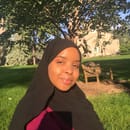I put my golden blonde hair into a messy bun before rushing out of my room to make it to the bus. My dad, who was sitting there with a newspaper as he sipped his morning coffee, looked up to watch as I grabbed my school stuff as quickly as possible.
Ever since I could read, I read. I would raid the teen section in the library every week as I grabbed four or five books to dive into. It was a tradition that I took very seriously because I loved to enter into the world that every book offered. However, as I got older, the excerpt above began to feel different. I no longer felt connected to the books I was reading as much I as I did before. Almost all the books I read were about white girls and the problems they faced in their suburban town, but I am an African American immigrant who definitely did not have blonde hair or a dad who read the morning newspaper. I grew up in the city where it was too unsafe to be out alone, but the stories I read about during my childhood had kids my age out and about in their safe small town.
I couldn’t quite understand what it was that I started to see. I was in high school when I had this realization and I just thought that I was looking too deep into things. It’s just a book I kept telling myself as I picked up more novels that had no connection to my life. It wasn’t until I watched the
TEDtalk “The Dangers of a Single Story” that it was made clear to me that it was a problem. How many people like me felt their identity to be forgotten as they read the countless books offered at the libraries that rarely had a character similar to themselves? How many young kids compare their lives in the inner city to the lives of the kids in the books who lived in big houses filled with everything their hearts desired? Yes, books are meant for us to temporarily leave our own reality, but what if the reality we live is never portrayed in what we consume?
Sometimes we need to entertain ourselves with stories of people we can never relate to, but we also need stories about people like us. Somalis need stories about Somalis, Latinxs need stories about Latinxs. Koreans about Koreans and the list goes on. We need to feel a sense of self when reading, we sometimes must have some way to connect to the words written in a book and feel that our reality is normal and common. The only way we can do that is by having more people of color as writers. The Data USA websites show a chart of the most common race or ethnicity of writers in the US in 2016. Their charts show that 86% of writers are white, while the second largest group is black or African American at a mere 5.7%.
Seeing these numbers made me remember the times I intentionally looked for novels with POC characters, and how it felt searching through the rows of bookshelves only to find one or two in every fifty or so books. This experience is probably very common, so the next question is: What can we do?
First, we must remember to support the writers around us no matter what race or ethnicity they may be, but we must also pay close attention to our POCs and encourage ourselves and each other to share our stories and experiences because no one else will. The fact of the matter is that the majority of us are waiting for someone else to take on the responsibility to share our story. We often forget that our narrative is ours to claim.
Personally, I never saw myself as a writer. I was also waiting for someone to take on the responsibility to tell my story, and after twenty years of living, I finally found the first Somali-American woman who wrote a novel. It was hard to get my hands on the book since it is not sold in any bookstores or found in many of the libraries, but when I did get my hands on it, I was blown away. I couldn’t believe so much of my lifestyle and beliefs were portrayed by the characters. The random words in Somali were comforting to read because I could relate to the book on another level. After finishing the book, I realized that I loved to write as well and that my voice is needed, so now I am trying my hardest to become a better writer and to share my story as well.
My last piece of advice: if you don’t see your voice, then be the voice. The world will never know of other existences unless someone is willing to put forth their story, making our world less of a single story and more of a multi-dimensional, culturally competent society.
Below I’ve listed a few POC authors whose works are enjoyed by many. I recommend reading their works and being inspired by their stories and style of writing.
POC authors to check out:
-
Chinua Achebe
-
Rupi Kaur
-
Celeste Ng
-
Lilliam Rivera
-
Yasmeen Maxamuud
-
Min Jin Lee
-
Chimamanda Ngozi Adichie
-
Mohsin Hamid
-
Ni-Ni Simone



